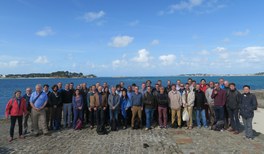Joint Press Release
of the German Physical Society (DPG) and the Wilhelm and Else Heraeus Foundation
Physics and Life
First French-German Wilhelm and Else Heraeus seminar dealt with physics in living systems / Start of further binational seminars to strengthen the European idea
Bad Honnef, Hanau, Germany, 25 September 2019 - Science is international and requires the free exchange of ideas and minds. However, in view of the increasingly widespread scepticism towards European integration, this matter of course is often forgotten. The committees of the Wilhelm and Else Heraeus Foundation therefore decided a year ago to set an example with a new series of events. "The aim of the new binational Wilhelm and Else Heraeus seminars is in particular to strengthen existing cooperation between scientists from Germany and a European partner country or to initiate new ones," says Prof. Joachim Treusch, Chairman of the Board of the Foundation.
The binational seminars are conducted in cooperation with the German Physical Society (DPG), which maintains close relations with the Physical Societies of France, Great Britain and Poland and awards binational scientific prizes together with them.
The prizewinners will also be offered the opportunity to organise a binational seminar. The seminars will take place alternately at the Physics Centre Bad Honnef and in the partner country; they will be financed entirely by the Wilhelm und Else Heraeus Foundation. "We must ensure that European cooperation is deepened. Bilateral projects like these should act as driver for this," emphasizes DPG President Dieter Meschede.
The new series of events kicked off in early September with a seminar entitled "Novel physics in living systems?" at the "Station Biologique de Roscoff" conference centre in Brittany, France. Organised by the winner of the German-French Gentner-Kastler Prize, Theo Geisel (Göttingen), together with his French colleague Hugues Chaté (Saclay), experienced and prospective scientists from France and Germany spent a week discussing, among other things, the challenges that biological systems pose to physics. This year will be followed by a Polish-German and a British-German seminar in Bad Honnef. Further seminars are in preparation for 2020.
The German Physical Society (Deutsche Physikalische Gesellschaft e. V.; DPG), which was founded way back in 1845, is the oldest national and, with more than 60,000 members, also the largest physical society in the world. As a non-profit-making organisation it pursues no economic interests. The DPG promotes the transfer of knowledge within the scientific community through conferences, events and publications, and aims to open a window to physics for the curious. Its special focuses are on encouraging junior scientists and promoting equal opportunities. The DPG’s head office is at Bad Honnef am Rhein. Its representative office in the capital is the Magnus-Haus Berlin. Website: www.dpg-physik.de
The non-profit Wilhelm und Else Heraeus Foundation has been supporting research and education in the natural sciences, especially physics, in a manifold manner for over 50 years. The foundation organizes international conferences and seminars, supports talented students and contributes in many ways to improving science teaching in schools. Founded in 1963 by the physicist and industrialist Dr Wilhelm Heinrich Heraeus and his wife Else Heraeus, the foundation works closely with the German Physical Society and is regarded as the most important private funding institution in this field in Germany. Website: https://www.we-heraeus-stiftung.de/english/
